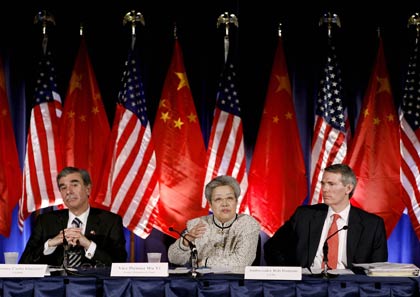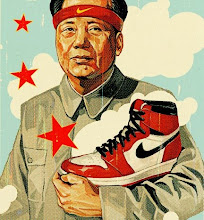In the 2nd semester of my sophomore year of college, I was honored to take a class with professor
Jeffrey Friedman entitled
Liberalism, Communitarianism and the Good. POLS V3027 was a political science class focused on theory and the development of political beliefs based on various factors, cultures and influences.
Not only did the class have an interesting focus, but it was taught extremely well. I can say that my life has been visibly changed since taking his class. These were some of the comments that students made after taking his class on
CULPA.
Professor Friedman is the best teacher I've had. He is brilliant (you may think you've had brilliant professors before but this experience will make you re-evaluate that), intellectually rigorous (what do you say about a teacher who is able to tie all the tangents together), challenging (you WON'T find anyone who thinks like him and he expects you to think for yourself as well) and compassionate (really listens to students and seems to care). I have also never taken a class with such devastating intellectual and political implications.
He made people feel self-conscious about the quality of their comments in class. But, I will be forever grateful that I took this class because I got over my fear of public speaking and it really opened my mind and challenged me to think constantly during the class. He comes off as opinionated, but I think that's just because he knows he's right :). He really took the discussion to places I have never before nor since traveled to in any other class here. Always challenging us NOT to assume things, not to be lazy in thinking liberal ideology is always right, to read critically - to have our "bullshit detector" always on.
He's simply mind-blowing, funny, and the smartest person I've ever met (and that's genius level, because I like to think I'm pretty smart myself!). His democracy class was the best class I've taken at BC-- the readings on public ignorance and human fallibility were so compelling that I can no longer read the NY Times in the same complacent way I used to. Really, he should write a book and change the world.
After his class, it has been has almost been impossible to find worthy reading material on the NY Times ... until now.
Going through all of the NY Times daily emails that I had forgotten about during the Olympics, I found an amazing article entitled
Harmony and the Dream written by op-ed columnist,
David Brooks. It describes the basic difference between individualistic and collective societies (exactly like my liberalism and communitarian class) under the auspice of the 2008 Olympics in Beijing where the idea of friends living in harmony was a central theme during the Games.
The world can be divided in many ways — rich and poor, democratic and authoritarian — but one of the most striking is the divide between the societies with an individualist mentality and the ones with a collectivist mentality.
This is a divide that goes deeper than economics into the way people perceive the world. If you show an American an image of a fish tank, the American will usually describe the biggest fish in the tank and what it is doing. If you ask a Chinese person to describe a fish tank, the Chinese will usually describe the context in which the fish swim.
These sorts of experiments have been done over and over again, and the results reveal the same underlying pattern. Americans usually see individuals; Chinese and other Asians see contexts.
This concept translates further than just the Olympics. It is embodied in politics, business, society and even personal friendships. It is the small, yet overarching difference between the East and West. And I believe it is the key for mutual understanding between the different worlds.
David Brooks should continue this train of thought and help Americans and the western world examine and reexamine its view of China. There is much more to be written and seen.
Here is the full text of the article:
The world can be divided in many ways — rich and poor, democratic and authoritarian — but one of the most striking is the divide between the societies with an individualist mentality and the ones with a collectivist mentality.
This is a divide that goes deeper than economics into the way people perceive the world. If you show an American an image of a fish tank, the American will usually describe the biggest fish in the tank and what it is doing. If you ask a Chinese person to describe a fish tank, the Chinese will usually describe the context in which the fish swim.
These sorts of experiments have been done over and over again, and the results reveal the same underlying pattern. Americans usually see individuals; Chinese and other Asians see contexts.
When the psychologist Richard Nisbett showed Americans individual pictures of a chicken, a cow and hay and asked the subjects to pick out the two that go together, the Americans would usually pick out the chicken and the cow. They’re both animals. Most Asian people, on the other hand, would pick out the cow and the hay, since cows depend on hay. Americans are more likely to see categories. Asians are more likely to see relationships.
You can create a global continuum with the most individualistic societies — like the United States or Britain — on one end, and the most collectivist societies — like China or Japan — on the other.
The individualistic countries tend to put rights and privacy first. People in these societies tend to overvalue their own skills and overestimate their own importance to any group effort. People in collective societies tend to value harmony and duty. They tend to underestimate their own skills and are more self-effacing when describing their contributions to group efforts.
Researchers argue about why certain cultures have become more individualistic than others. Some say that Western cultures draw their values from ancient Greece, with its emphasis on individual heroism, while other cultures draw on more on tribal philosophies. Recently, some scientists have theorized that it all goes back to microbes. Collectivist societies tend to pop up in parts of the world, especially around the equator, with plenty of disease-causing microbes. In such an environment, you’d want to shun outsiders, who might bring strange diseases, and enforce a certain conformity over eating rituals and social behavior.
Either way, individualistic societies have tended to do better economically. We in the West have a narrative that involves the development of individual reason and conscience during the Renaissance and the Enlightenment, and then the subsequent flourishing of capitalism. According to this narrative, societies get more individualistic as they develop.
But what happens if collectivist societies snap out of their economic stagnation? What happens if collectivist societies, especially those in Asia, rise economically and come to rival the West? A new sort of global conversation develops.
The opening ceremony in Beijing was a statement in that conversation. It was part of China’s assertion that development doesn’t come only through Western, liberal means, but also through Eastern and collective ones.
The ceremony drew from China’s long history, but surely the most striking features were the images of thousands of Chinese moving as one — drumming as one, dancing as one, sprinting on precise formations without ever stumbling or colliding. We’ve seen displays of mass conformity before, but this was collectivism of the present — a high-tech vision of the harmonious society performed in the context of China’s miraculous growth.
If Asia’s success reopens the debate between individualism and collectivism (which seemed closed after the cold war), then it’s unlikely that the forces of individualism will sweep the field or even gain an edge.
For one thing, there are relatively few individualistic societies on earth. For another, the essence of a lot of the latest scientific research is that the Western idea of individual choice is an illusion and the Chinese are right to put first emphasis on social contexts.
Scientists have delighted to show that so-called rational choice is shaped by a whole range of subconscious influences, like emotional contagions and priming effects (people who think of a professor before taking a test do better than people who think of a criminal). Meanwhile, human brains turn out to be extremely permeable (they naturally mimic the neural firings of people around them). Relationships are the key to happiness. People who live in the densest social networks tend to flourish, while people who live with few social bonds are much more prone to depression and suicide.
The rise of China isn’t only an economic event. It’s a cultural one. The ideal of a harmonious collective may turn out to be as attractive as the ideal of the American Dream.
It’s certainly a useful ideology for aspiring autocrats.




 Ant City
Ant City